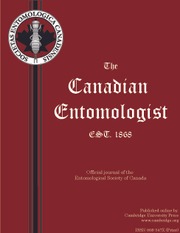Crossref Citations
This article has been cited by the following publications. This list is generated based on data provided by
Crossref.
Embree, D. G.
1966.
The Role of Introduced Parasites in the Control of the Winter Moth in Nova Scotia.
The Canadian Entomologist,
Vol. 98,
Issue. 11,
p.
1159.
Pschorn-Walcher, Hubert
and
Zwölfer, Helmut
1968.
Konkurrenzerscheinugen in Parasitenkomplexen als Problem der Biologischen Schädlinfbekämpfung.
Anzeiger für Schäadlingskunde,
Vol. 41,
Issue. 5,
p.
71.
Embree, D. G.
1971.
Biological Control.
p.
217.
Embree, D. G.
1971.
Biological Control.
p.
217.
1981.
Biology of Insect Eggs.
p.
779.
Odell, Thomas M.
and
Godwin, Paul A.
1984.
Host selection byBlepharipa pratensis (Meigen), a tachinid parasite of the gypsy moth,Lymantria dispar L..
Journal of Chemical Ecology,
Vol. 10,
Issue. 2,
p.
311.
HOLLIDAY, N. J.
1985.
Maintenance of the phenology of the winter moth (Lepidoptera: Geometridae).
Biological Journal of the Linnean Society,
Vol. 25,
Issue. 3,
p.
221.
Roland, Jens
Evans, W. G.
and
Myers, Judith H.
1989.
Manipulation of oviposition patterns of the parasitoidCyzenis albicans (Tachinidae) in the field using plant extracts.
Journal of Insect Behavior,
Vol. 2,
Issue. 4,
p.
487.
O’Hara, James E.
and
Cooper, Bruce E.
1992.
REVISION OF THE NEARCTIC SPECIES OF CYZENIS ROBINEAU-DESVOIDY (DIPTERA: TACHINIDAE).
The Canadian Entomologist,
Vol. 124,
Issue. 5,
p.
785.
Roland, Jens
Denford, Keith E.
and
Jimenez, Luis
1995.
BORNEOL AS AN ATTRACTANT FOR CYZENIS ALBICANS, A TACHINID PARASITOID OF THE WINTER MOTH, OPEROPHTERA BRUMATA L. (LEPIDOPTERA: GEOMETRIDAE).
The Canadian Entomologist,
Vol. 127,
Issue. 3,
p.
413.
Schmid-Hempel, Regula
and
Schmid-Hempel, Paul
1996.
Host choice and fitness correlates for conopid flies parasitising bumblebees.
Oecologia,
Vol. 107,
Issue. 1,
p.
71.
Horgan, Finbarr G.
Myers, Judith H.
and
Van Meel, Rose
1999.
Cyzenis albicans(Diptera: Tachinidae) Does Not Prevent the Outbreak of Winter Moth (Lepidoptera: Geometridae) in Birch Stands and Blueberry Plots on the Lower Mainland of British Columbia.
Environmental Entomology,
Vol. 28,
Issue. 1,
p.
96.
Broadley, Hannah J.
Kelly, Emily A.
Elkinton, Joseph S.
Kula, Robert R.
and
Boettner, George H.
2018.
Identification and impact of hyperparasitoids and predators affecting Cyzenis albicans (Tachinidae), a recently introduced biological control agent of winter moth (Operophtera brumata L.) in the northeastern U.S.A..
Biological Control,
Vol. 121,
Issue. ,
p.
99.
Elkinton, Joseph S.
Boettner, George H.
and
Broadley, Hannah J.
2021.
Successful biological control of winter moth, Operophtera brumata, in the northeastern United States.
Ecological Applications,
Vol. 31,
Issue. 5,

